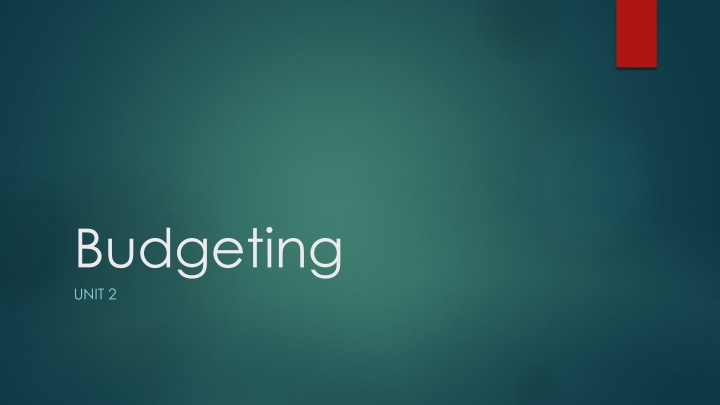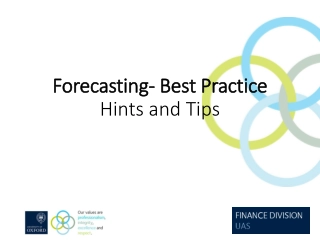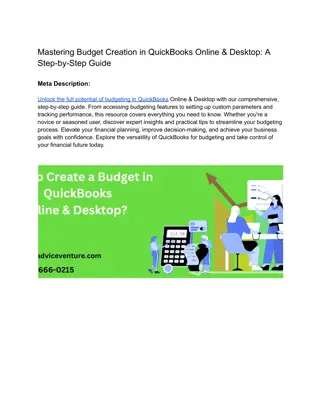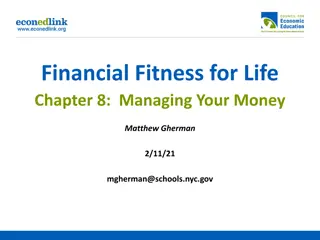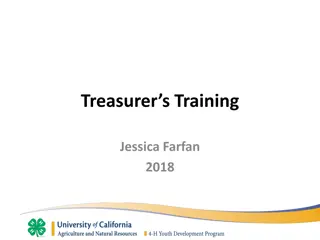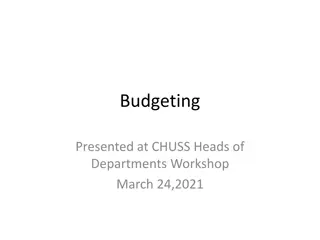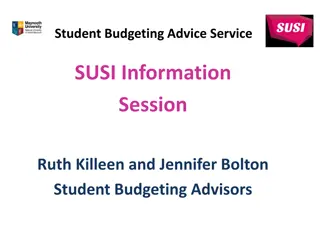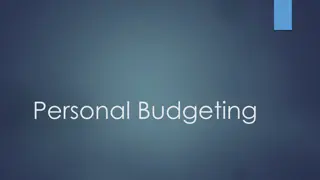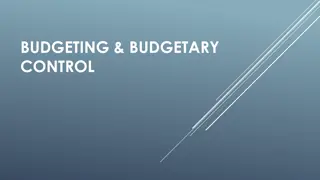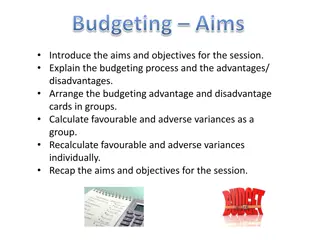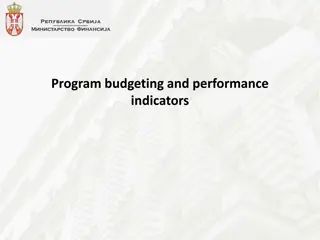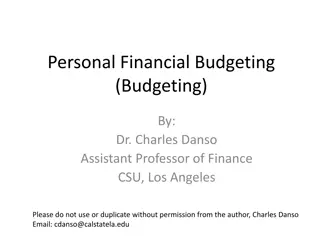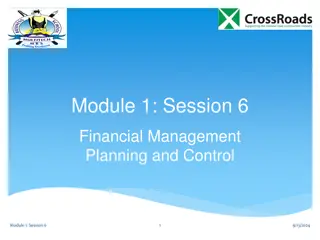Essential Guide to Budgeting: Learn to Manage Your Finances Effectively
Explore the fundamental concepts of budgeting, including the importance of setting financial goals, prioritizing expenses, and creating a flexible budget plan. Discover how to allocate your income wisely, pay yourself first, and track your cash flow to achieve financial stability. Gain insights into managing assets, liabilities, and net worth effectively for better financial decision-making.
Download Presentation

Please find below an Image/Link to download the presentation.
The content on the website is provided AS IS for your information and personal use only. It may not be sold, licensed, or shared on other websites without obtaining consent from the author.If you encounter any issues during the download, it is possible that the publisher has removed the file from their server.
You are allowed to download the files provided on this website for personal or commercial use, subject to the condition that they are used lawfully. All files are the property of their respective owners.
The content on the website is provided AS IS for your information and personal use only. It may not be sold, licensed, or shared on other websites without obtaining consent from the author.
E N D
Presentation Transcript
Budgeting UNIT 2
Go into google classroom and open up Bell Ringer for Budgeting Picture yourself as an independent adult with a career: Do you keep a budget either formally or informally? What are things that you think about when budgeting ( income, expenses) If you were planning on going to prom what would be some of the things you would need to budget for???
A Budget is a plan for managing your money for a given period of time, A successful budget is Budgets help you: Carefully planned Set priorities Practical Achieve goals A good budget is: Flexible Written or typed Realistic Accessible Ongoing Clear
What would a budget look like for you right now?? What does yours look like??? Savings 9%My Budget Entertainment 10% Car 58% Clothing 23%
Budgets come in all shapes and sizes What do you think would be the biggest thing that your parents would have to budget for?
When creating a budget there are parts that we must define Assets Liabilities Net worth P.Y.F. Income Expense Cash Flow
P.Y.F. Pay yourself first This doesn t mean to pay yourself some exuberant salary. It does mean to set some money aside each pay period. Maybe $5 or $10 but pay yourself first
Cash Flow Statement Cash Flow statement is simply how much money do you make and how much do you spend. How much money do you make INCOME How much do you spend - Expenses
Income Income is money you receive as payment for goods or services Hourly wages getting paid by the hour Salary Yearly amount ( can be paid weekly ,bi-monthly, monthly) Interest Payment to you for the money that was borrowed from you by bank. Capital Gains Money made from sale of asset for more than the purchase price. Commission- Money earned based on a percentage of sales. Dividends payment for purchase of stock Interest Income When talking about a budget we have to first determine how much we make
The other two are a little bit more confusing . Gross Income Is the total amount of money that you make before anyone gets a hold of it. Disposable income -The amount of money that households have available for spending and saving after income taxes have been accounted. ( what you have to live on) Discretionary income - The amount of an individual's income that is left for spending, investing or saving after taxes and personal necessities (such as food, shelter, and clothing) have been paid. ( This is your fun money)
How to read a paycheck stub article: Read this article
More budgeting terms Expenses the amount that is spent to operate a business or for payment of a good or service. Fixed Expenses Expenses that do not change from month to month We spend our many in all kinds of different ways but we categorize them in three areas . Car Home Gym membership Variable Expenses-Expenses that change from month to month Gas Electric Entertainment Periodic Expenses- Expenses that occur once in a while Car breaks down Air conditioner stops working.
4 more types of income you hear about all the time but may not be familiar with . Lets start at the very beginning Gross Income Not the icky income but the income we make before anybody gets it. It is the total amount that is due to you . Net Income ( pay) or Take home pay This is the amount that you are left with after everyone gets their hands on it. Gross Pay Deductions Net Pay
So let me see if I can clear this up a little more . Lets talk a little bit more about these .. Minus Your Bills Minus- (taxes) . Disposable Income Discretionary Income Gross pay
These items we take away from our gross pay are called deductions. There are two types of deductions Voluntary We chose to have them deducted from our pay check What would these be?? Your own retirement Some health Involuntary They are automatically taken from our checks What would these be?? Taxes (UGH)
Taxes ( we will revisit these later) Federal Income Tax Based on the money you make FICA ( Federal Insurance Contributions Act) 2 Parts Social Security Medicare State and local Taxes
Balancing a Budget Balancing the budget is the balance between money you make (income) and money you spend (expenses) If Income is greater than Expenses = Surplus Net Income If Income is less than Expenses = Deficit Net Loss
In simple terms it is the money going in and the money going out . Think of it like this You have a glass of water If you glass has a big hole in the bottom of it you will never have water to drink that would be called a deficit If your class doesn t have a hole in it, it will soon overflow and you will have a surplus
The nuts and Bolts of Budgeting.. Budgets are all based on something called Cash Flow. As we have already discussed money in = income, money out = expenses
We need to define some things before we can really determine our cash flow Assets Something of value to you. Cash, your home, your car Liabilities Something that you owe to someone else Car loan, home loan, student loans
Budgeting 6.1 Budgeting Basics Salary-Based Budgeting Salary-Based Budgeting In this activity you will: choose a potential career path determine your take-home pay set aside money to pay yourself first try your hand at an independent adult s budget and then reflect on the process of budgeting. www.nextgenpersonalfinance.org View all NGPF's lessons on Gooru
Budgeting 6.1 Budgeting Basics Salary-Based Budgeting STEP 1: Open the Salary-Based Budgeting worksheet, then click File Make a copy Name your worksheet LAST NAME, FIRST INITIAL budget Close the original Salary-Based Budgeting worksheet Use your copy of the worksheet to record all the work for this project.
Budgeting 6.1 Budgeting Basics Salary-Based Budgeting STEP 2: Visit PayScale s Salary Data & Career Research Center. To locate your future career s salary: Type the career in the box and push SEARCH. Use the lowest entry in the given salary range, because you ll be making the starting salary at first. Remember, these are averages, so you could start lower or higher in reality. Once you find your career, record the salary as your Annual Gross Wage on step 2 of your budget worksheet.
Budgeting 6.1 Budgeting Basics Salary-Based Budgeting STEP 3: Calculate your monthly Gross Wage. Gross Wage (monthly) = Annual Gross Wage / 12 Record on your budget spreadsheet. *While wage and salary are different (in how your are paid), for this activity both refer to the money earned from working **From this point on, you ll use MONTHLY amounts for all budget entries.
Budgeting 6.1 Budgeting Basics Salary-Based Budgeting STEP 4: Use the ADP Salary Paycheck Calculator to find your Net Pay (the wage you actually take home each month, after deductions). To do the activity correctly, choose the state you ll be living in and then use these values: Gross Pay = Your Gross Wage (monthly) PER PAY PERIOD Pay Frequency = Monthly Federal Filing Status = single (unless you re married) # of federal allowances = 1 (unless you have dependent children) Leave all other values as they are. Record Net Pay on budget spreadsheet under Net Wage (monthly)
Budgeting 6.1 Budgeting Basics Salary-Based Budgeting STEP 5: Pay yourself first by putting aside a percent of your net salary into a savings account. Choose one of the percents below, and calculate how much you ll be saving off your net salary. 5% this is low, but better than nothing 10% this is a good goal for your first career; increase later 15% terrific savings goal! Savings = Net Wage (monthly) * % savings (remember 5% = .05)
Budgeting 6.1 Budgeting Basics Salary-Based Budgeting STEP 6: It s never too young to start saving for retirement. You want to set aside another portion of your net salary to put toward retirement. 5% this is low, but better than nothing 10% this is a good goal for your first career; increase later 15% terrific retirement goal! Retirement = Net Salary (monthly) * % retirement (5% = .05)
Budgeting 6.1 Budgeting Basics Salary-Based Budgeting STEP 7: Calculate the total amount you re saving each month. Total Monthly Savings = Monthly Savings Account + Monthly Retirement
Budgeting 6.1 Budgeting Basics Salary-Based Budgeting STEP 8: Calculate the monthly amount you have to budget. **Savings is NOT an expense; it s the money you re setting aside for your own future. However, it s also money that you shouldn t spend on other things each month, so it gets taken out BEFORE you do your monthly budget. Monthly Amount to Budget = Net Salary (monthly) - Total Savings
Budgeting 6.1 Budgeting Basics Salary-Based Budgeting STEP 9: RENT To determine how much you will spend on rent, choose the type of living situation you see yourself in. Option A: Live at home Option B: Live in an apartment/house by yourself Option C: Live in an apartment/house with roommates Go to the slide for your choice to determine your rent cost.
Budgeting 6.1 Budgeting Basics Salary-Based Budgeting STEP 9A: RENT (Live at home) Option 1: If you re planning to live at home or with other relatives, estimate how much they re going to charge you per month. Better yet, ASK! Do not assume they ll let you live rent free! Record the answer in Monthly Rent. If you re planning to live on your own or with roommates, continue on.
Budgeting STEP 9B: RENT (Live in an apartment/house by yourself ) If you want to live completely on your own, use the Rent Comparison Tool on RentJungle to calculate your Monthly Rent: a) In APARTMENT ADDRESS, input the city you would like to live in after college. b) Under BEDROOMS, select STUDIO OR ONE BEDROOM c) Under CURRENT OR LIKELY RENT, indicate how much you would like to pay per month. Look at your Monthly Amount to Budget and be sure not to spend more than 25% on Housing. d) Under QUALITY OF BUILDING, use the number of stars as a proxy for the quality of the building (5 stars is the highest rating). d) Select "FIND OUT INSTANTLY" e) On next page, under HOW MUCH SHOULD YOU PAY, you will be given a range of rental rates (e.g., monthly rents for 1 bedroom apartments range from $780 to $1,040 per month). Take the average of these two figures as your MONTHLY RENT. 6.1 Budgeting Basics Salary-Based Budgeting
STEP 9C: RENT (Live in an apartment/house with roommates) Option 3: If you are willing to live with roommates ($ saving!), use the Rent Comparison Tool on RentJungle to calculate your Monthly Rent: a) In APARTMENT ADDRESS, input the city you would like to live in after college. b) Select # of BEDROOMS based on total number of people living there (you + roommates) c) Under CURRENT OR LIKELY RENT, indicate how much you would like to pay per month. Look at your Monthly Amount to Budget and be sure not to spend more than 25% on Housing. d) Under QUALITY OF BUILDING, use the number of stars as a proxy for the quality of the building (5 stars is the highest rating). e) Select "FIND OUT INSTANTLY" e) On next page, under HOW MUCH SHOULD YOU PAY, you will be given a range of rental rates for your city (e.g., monthly rents for 2 bedroom apartments range from $780 to $1,040 per month). Take the average of these two figures as your MONTHLY RENT. Monthly Rent = rent price / # of people living there
Budgeting 6.1 Budgeting Basics Salary-Based Budgeting STEP 10: Renter s Insurance You want to have renter s insurance, to cover replacement of your belongings in case of theft or apartment-wide damage (flood, fire, etc). Unless you have a lot of expensive stuff, you can budget $20 for Renter s Insurance.
Budgeting 6.1 Budgeting Basics Salary-Based Budgeting STEP 11a: Utilities If you re living with family, they may expect you to chip in full or partial amounts. (Ask what you owe) If you re living on your own, you ve got to pay the full costs. With roommates, you get to split a lot (but not all) of these costs. Remember to divide those bills by the # of people!
STEP 11b: Utilities Cable/Satellite Budgeting 6.1 Budgeting Basics Salary-Based Budgeting (Choose 1) Internet Average Cost $38 Broadcast TV $0 Basic Cable $80 Home Phone Premium Cable $125 Average Cost $20 Cell Phone (Choose 1) Voice Only $40 Gas/Electric Voice & Data $75 Average Cost $163
Budgeting 6.1 Budgeting Basics Salary-Based Budgeting STEP 12: Calculate your total monthly budget for the cost of living. Cost of Living = Rent + Renter s Insurance + Cable/Satellite + Internet + Home Phone + Mobile Phone + Electricity/Gas
Budgeting 6.1 Budgeting Basics Salary-Based Budgeting STEP 13: Public Transportation (Busses, Trains, etc.) If you re living in a city that allows you to get where you need via Public Transportation, and you re not going to have a car at all, use one of the figures below: **If you will only use public transportation, skip to Step 18 TRANSPORTATION COST IN ST. LOUIS New Orleans, Los Angeles $90 Honolulu, New York $135 Chicago $105 Washington, DC $195 Miami, San Francisco $120 I m going to use a car instead $0
Budgeting 6.1 Budgeting Basics Salary-Based Budgeting STEP 14: Car Payment If you re going to have a car, choose one of the following Car Payments (3 year loan, 4.75%): **If you are using public transportation, you pay $0 for a car Cost of a Car that you wish to Drive $8,000 car -- $240/mo $10,000 car -- $300/mo $15,000 -- $450/mo $20,000 car -- $600/mo $30,000 car -- $900/mo $45,000 -- $1340/mo
Budgeting 6.1 Budgeting Basics Salary-Based Budgeting STEP 15: Car Insurance Assume between $164 (good rate, no accidents/violations, or less coverage) and $333 per month (worse rate, accidents/violations, or premo coverage)-- you must be insured! Use this website to find a quote https://www.thegeneral.com/quote/ STEP 16: Car Maintenance Assume $100 per month -- some months will be $0, but some will be expensive!
Budgeting 6.1 Budgeting Basics Salary-Based Budgeting STEP 17: Gas Estimate how many miles you ll drive per day and use this chart to find your gas prices (based on $3.55/gallon and 23.6mi/gallon): Miles Per Day Monthly Cost of Gasoline 25 $113 35 $158 45 $203
Budgeting 6.1 Budgeting Basics Salary-Based Budgeting STEP 18: Calculate your total monthly budget for transportation. Cost of Transportation = Public Transportation + Car Payment + Car Insurance + Car Maintenance + Gas
Budgeting 6.1 Budgeting Basics Salary-Based Budgeting STEP 19: Choose which meal plan you re likely to follow for the cost of Groceries: Thrifty Low Cost Moderate Cost Liberal Cost Females $167 $211 $259 $332 Males $188 $242 $303 $373
Budgeting STEP 20: Choose which plan you re likely to follow for the cost of Dining Out: 6.1 Budgeting Basics Salary-Based Budgeting $10/meal $15/meal $20/meal $30/meal $40 $60 $80 $120 1 meal/week $80 $120 $160 $240 2 meals/week $120 $180 $240 $360 3 meals/week $200 $300 $400 $600 5 meals/week
Budgeting 6.1 Budgeting Basics Salary-Based Budgeting STEP 21: Calculate your total monthly budget for food. Cost of Food = Groceries + Eating Out
Budgeting 6.1 Budgeting Basics Salary-Based Budgeting Calculate the cost of your insurance STEP 22: Health Insurance If you are single: Average $999/yr Remember to divide by 12 to get the monthly cost STEP 23: Dental Insurance - $25/month STEP 24: Vision Insurance - $25/month
Budgeting 6.1 Budgeting Basics Salary-Based Budgeting STEP 25: Haircare If you already know how much you pay for a haircut, enter it. If you re not sure, use the US averages: Men $28 Women **If you only get a haircut every 3 months, divide the cost by 3. $44 STEP 26: Other Grooming/Hygiene Everyone s different, but let s assume $25/mo for other hygiene, medication, grooming, or personal needs.
Budgeting 6.1 Budgeting Basics Salary-Based Budgeting STEP 27: Gym Membership Remember, the first step to wealth is health! If you don t workout, or you do it free outside or at home, $0. Otherwise, assume $58/mo for a gym membership.
Budgeting 6.1 Budgeting Basics Salary-Based Budgeting STEP 28: Calculate your total monthly budget for health. Cost of Health = Health Insurance + Dental Insurance + Vision Insurance + Haircuts + Other Grooming/Hygiene + Gym Membership
Budgeting 6.1 Budgeting Basics Salary-Based Budgeting STEP 29: Student Loan Payments If you did not go to any post-high school schooling, or you somehow did so without any student loan debt, congrats on paying $0/month! Please use this website in determining your debt and where it falls on this chart http://ticas.org/posd/map-state-data-2015#overlay=posd/state_data/2015/mo Debt $10,000 $20,000 $30,000 $40,000 $50,000 Monthly Loan Payment $115 $230 $345 $460 $575
